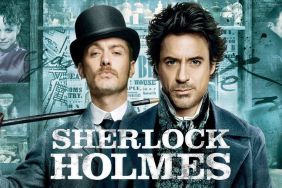As our readers probably know, ComingSoon.net talks to a lot of filmmakers and actors over the course of any year, and every once in a while, we get to talk to one of our favorites who might not be as obvious or expected. That’s certainly the case last year when we finally had a chance to meet character actor Eddie Marsan.
Ever since we first saw Marsan’s subtle performance as Reg in Mike Leigh’s Vera Drake, we’ve been fans. Since then, he blew us away with his role as a cranky driving instructor in Leigh’s Happy-Go-Lucky, he’s played a bad guy in Will Smith’s Hancock and portrayed legendary actor John Houseman in Richard Linklater’s Me and Orson Welles, now in select cities. He also knocked one out of the park as a kidnapper in the Toronto Film Festival highlight The Disappearance of Alice Creed, which hopefully will grace our shores next year.
In fact, you’re more than likely to have seen Marsan in any of the dozens of movies he’s appeared in over the past decade without even realizing it was him!
Although he has played a lot of strange characters, both villains and supporting ones, Marsan has always been an actor’s actor, and possibly the craziest thing is that Marsan rarely does many interviews, so it was absolutely a thrill to finally get a chance to meet and talk to him when we visited the London set of Guy Ritchie’s Sherlock Holmes last year. Marsan’s character Inspector Lestrade of Scotland Yard is quite a great foil to Robert Downey Jr.’s Sherlock Holmes and we just loved this interview way too much to let it end up on the cutting room floor. Just to give you some perspective, this interview was done literally the day after the amazing 2008 Presidential Election, so there was a lot of energy as we began as we excitedly talked about it.
ComingSoon.net: Who do you play in this movie?
Eddie Marsan: I play Inspector Lestrade, Lestrade of the Yard, a Scotland Yard detective who runs through most of the Sherlock Holmes books. Holmes is a genius and Lestrade isn’t a genius, so there’s kind of a feeling of inferiority on Lestrade’s part, but there’s a mutual respect between Lestrade and Holmes, although Holmes teases Lestrade all the time and infuriates him. There’s a great description in one of the books where Holmes describes Lestrade as a very good detective, very determined, but devoid of any imagination, and that’s why he can’t think outside the box. Holmes sees things and put things together; Lestrade hasn’t got a clue. Quite often, he’s the man who turns up late.
CS: Were you aware of the character growing up? Did you read the books?
Marsan: No, I didn’t. I don’t remember ever seeing anyone play Lestrade, so what I did was I read… there are some books on Lestrade, short stories that I read, and I read a couple of Sherlock Holmes books, and I decided to then look at the script as a point of reference and judge it in that way.
CS: What kind of research do you do for a role like this? Did you look into what Scotland Yard was like in those times?
Marsan: Yeah, what I use is photographs and music. I find period music, music of the time, really useful to me, and photographs. Whenever I start a film, I go to the make-up department and I go to the production design and say, “Can I have any of your source material?” and you get great photographs of police stations and people. Just people you have no affinity with and you create relationships with them. I work with that man, I don’t like this guy. That’s my mother, that’s my wife, and you create a world. Music is very good, because you don’t realize how much we live in the 21st Century, and period music has a certain tempo and rhythm that helps get you into the tempo and rhythm of the period really.
CS: You’ve done so many period pieces and it’s really only this year where we see you do contemporary things like “Hancock” and “Happy-Go-Lucky” where we see you in the modern age.
Marsan: I think actors have to be very careful. It’s a discipline, because as an actor, you have to be self-aware, you have to realize that certain qualities that you have are not conducive to period pieces so you have to work to change them. Some actors don’t. You watch period pieces and there’s something strangely modern about them, it doesn’t work.

CS: Even though this is a period piece, we’ve been told that it has a more loosely modern feel to it. Have you noticed that?
Marsan: I tell you what it does have. I think the character of Sherlock Holmes is on the cusp of the end of the 19th Century and the beginning of the 20th Century, so what you have is a 20th Century Man at the end of the 19th Century. That’s how I look at it, and when I look at Holmes, that’s what I see. When I look at Holmes in contrast to Lestrade, Lestrade is a man of the 19th Century and Holmes is a man of the 20th Century, and that’s the dynamics of the two characters.
CS: Do you think Lestrade respects Holmes?
Marsan: Yeah, he does, but he doesn’t tell him. (laughter)
CS: We’ve seen that Holmes and Watson get into some action, but does Lestrade get involved in any of that or is he always coming in too late?
Marsan: He gets a kick in now and again. Lestrade is like an old-fashioned copper. Holmes will use deduction to work things out. Lestrade will pull them in, probably beat them up until they tell him what he wants. He’s an old Victorian policeman. If you’re rude to him, he’ll probably put you in a cell for a couple hours to teach you a lesson.
CS: Do you have any particular aspect of the film that you enjoy more than the rest, a favorite scene maybe that you really enjoyed?
Marsan: There’s a big chase scene at the end. The climax, the last third of the film is really exciting and edge-of-your-seat stuff. We’re running out of time to save the world and all that kind of stuff, it’s quite exciting to me.
CS: What are you doing today? Are you part of the arrest process for Lord Blackwood?
Marsan: We’re doing the first scene today, which is the arrest of Blackwood, and Lestrade turns up late. The thing about Lestrade is that when he comes in, he thinks he’s running the investigation, so that’s what’s funny about it. He comes in kind of having a go at Holmes for not waiting for him. “You should have waited for my orders” and all this, but Holmes thinks the girl would have been dead (if he waited) so it’s quite funny actually.
CS: Guy Ritchie fans who’ve watched the extras on his early DVDs might have heard that his movies are always quite boisterous sets to work on. Is that’s something that’s continued on this one?
Marsan: This is the first time I’ve worked with him, and no, I don’t find this boisterous. There’s something strangely calm about him. I find him (to be a) very, very calm man. When I work with him, I find that it relaxes me. He doesn’t get fussed. He never says anything that’s superfluous and he seems to enjoy and is very open to suggestions for things. I have mutual friends who worked on “Lock Stock” and “Snatch” and “Revolver” but I don’t know. This set doesn’t appear to be boisterous to me. It seems to be very calm for some reason.
CS: What suggestions have you come to him with about your character? Did you have any involvement in his look?
Marsan: Basically, as an actor, you have to come to the table with something. That’s what they employ you for, you come in and bring ideas and he’s very open to ideas. What you say is “This is what I think is the essence of the character or the main qualities of the character, what do you think about that?” If he likes it, then every suggestion you come to him, he’s got that point of reference. He knows where you’re coming from and it’s been a very collaborative effort between me, him, Robert, Jude… ’cause there’s a lot of dynamics. The funny thing is that being–well, not in the case of Robert although he studied Holmes–but being British, the British know these characters. They know the class divide and all that. It’s very easy for us to work out what Lestrade thinks of Holmes. He thinks he’s Bohemian and a bit posh and arrogant.

CS: Does this feel like a Guy Ritchie movie to you or what we know as a Guy Ritchie movie?
Marsan: You know what? I know what Guy Ritchie’s movies look like when I see them and not while they’re making them, so from making it, I have no previous experience so I can’t tell.
CS: But what about your expectations and what you envisioned it might be like?
Marsan: I tell you what, I think it’s an exciting, funny… it’s a rollercoaster ride of a movie, and it’s set in London, it’s Sherlock Holmes…I think it’s perfect for the qualities that he brings to film.
CS: Robert has a reputation for doing a lot of improv while he’s working, so is there room for that in a period piece like this?
Marsan: Yeah, the thing about improv is–and I do half of my work with Mike Leigh–is that improv is very disciplined. It isn’t like, “Roll the camera and I’ll come up with something funny.” It’s never like that. It’s always based on… you have a thought, you express the thought and then you edit it and then you do it again, you clean it up, and Robert’s very disciplined at that, and he’s always trying to find something new to do. His mind is always working. I’ve never worked with Robert before, but he’s very very very creative, his mind is racing all the time, and the character of Holmes is like that as well, but he’s also very disciplined. You can see some films where it’s based on improvisation and if there’s no discipline to anchor it, it falls apart, but he’s very disciplined.
CS: You used to play a lot more nice guys, sort of meek characters, and then that changed last year when you started playing more bad guys. Was that a very conscious thing and does Lestrade continue in that direction?
Marsan: The character in “Hancock,” “Happy-Go-Lucky” and this, they’re quite belligerent characters. I dunno. I tell you what. I think being a character actor, no one employs me to be me, because I don’t really exist on film. You get a certain star who has a star quality then you pay for that star quality. Somebody like me, they don’t pay for me to do that. They pay me to create the characters, so in a sense, it’s never a conscious decision. If I’m working as a character actor, invariably there will be diversity, because that’s how I earn a living and that’s what’s asked of me.
CS: But definitely recently you seem to have shifted more in that direction and I wondered if you said “Okay, no more nice guys.”
Marsan: No, I’ll tell you what I think happened. With Mike Leigh, when we were doing “Happy-Go-Lucky,” he used certain qualities for me in “Vera Drake,” and he wanted to stretch me the other way, so he initiated that. “Hancock” came from I had worked with Michael Mann before and he produced “Hancock” and Michael Mann is good friends with Alejandro González Iñáritu and Michael loves “21 Grams” and in that, I was quite a fiery preacher and they wanted that quality I think for the character in “Hancock.” My job is to disappear really, so no one goes to see an “Eddie Marsan movie.”
As fans of his work, we respectfully disagree and you can see why we love Eddie Marsan so much whenever he shows up on screen as Inspector Lestrade in Sherlock Holmes, which opens everywhere on Christmas Day, December 25.









